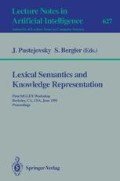Abstract
This paper argues that there is no reason to distinguish between lexical information and real-world information on the basis of the formalisms used; that both types of knowledge can be expressed in the same formalism. However, it also argues that there is information that is uniquely lexical in content, and this information consists of verb-independent definitions for thematic relations such as cause and effect that alter the representation of a verb depending on the presence or absence of certain verb arguments.
Preview
Unable to display preview. Download preview PDF.
Editor information
Rights and permissions
Copyright information
© 1992 Springer-Verlag Berlin Heidelberg
About this paper
Cite this paper
Palmer, M. (1992). General lexical representation for an effect predicate. In: Pustejovsky, J., Bergler, S. (eds) Lexical Semantics and Knowledge Representation. SIGLEX 1991. Lecture Notes in Computer Science, vol 627. Springer, Berlin, Heidelberg. https://doi.org/10.1007/3-540-55801-2_39
Download citation
DOI: https://doi.org/10.1007/3-540-55801-2_39
Published:
Publisher Name: Springer, Berlin, Heidelberg
Print ISBN: 978-3-540-55801-9
Online ISBN: 978-3-540-47288-9
eBook Packages: Springer Book Archive

